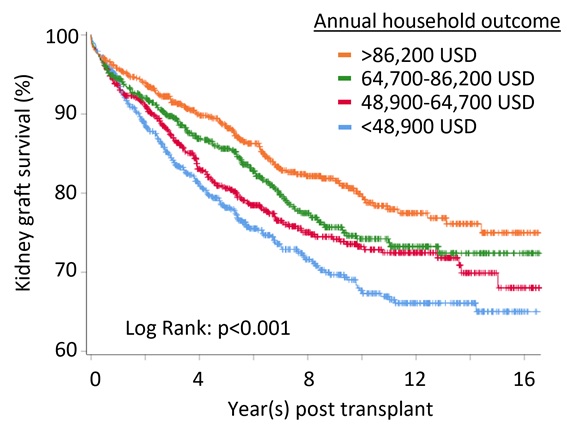Low Socio-economic Status is Associated with Lower Kidney Graft Survival and Increased Risk of Graft Failure Due to Acute Rejection
1Department of Surgery, University of Maryland School of Medicine, Baltimore, MD, 2Department of Medicine, University of Maryland School of Medicine, Baltimore, MD
Meeting: 2021 American Transplant Congress
Abstract number: 282
Keywords: African-American, Outcome, Rejection, Survival
Topic: Clinical Science » Organ Inclusive » Non-Organ Specific: Disparities to Outcome and Access to Healthcare
Session Information
Session Name: Disparities in Access and Outcomes in Kidney Transplantation
Session Type: Rapid Fire Oral Abstract
Date: Monday, June 7, 2021
Session Time: 6:00pm-7:00pm
 Presentation Time: 6:05pm-6:10pm
Presentation Time: 6:05pm-6:10pm
Location: Virtual
*Purpose: Low socio-economic status (SES) has been shown to be associated with poor kidney graft outcomes. We aimed to characterize differences in high and low SES kidney recipients and identify interventions to improve graft survival.
*Methods: Kidney transplants performed at the University of Maryland Medical Center between January 1994-June 2020 were evaluated. Income was estimated from recipient’s zip code using income tax statistics from the IRS. Primary outcome studied was graft survival. Kaplan-Meier survival analysis, univariate and multivariate Cox regressions were performed.
*Results: There were 3131 kidney recipients available for analysis. Income quartile (IQ) cutoff at 25%, 50% and 75% were $48,851, $64,602, and $86,306 USD respectively. Demographics were heterogeneous between IQ except for gender. Recipients in the lowest IQ were more likely to be younger, have higher BMI, have achieved a high school degree at transplant, and self-identified their race as Black. The worst graft survivals were experienced by those in the lowest IQ (Fig 1). Cox regression analysis showed that those in the lower two IQs had a 1.7-fold (95%CI, 1.4-2.1) and 1.4-fold (95%CI, 1.1-1.8) increased risk of graft loss, respectively, compared to those in the highest IQ. Graft failure due to acute rejection was more frequent in the lower IQ. Mixed and Black race were associated with an increased risk of graft loss by 2.9-fold (95%CI, 1.8-4.5) and 2.1-fold (95%CI, 1.9-2.4), respectively, compared to White race. Older recipient age and lower levels of education also negatively impacted graft survival. In multivariate analysis, lower SES, Black race, and older age were all independently associated with poor graft survival.
*Conclusions: Low SES negatively impacts kidney graft survival along with race, education and age. Identifying increased rate of graft failure due to acute rejection in low SES groups transforms SES to a modifiable variable. Special attention from at-risk programs to address systemic barriers to healthcare access, provide close surveillance and improve adherence to immunosuppression must be given to renal transplant recipients with low SES.
To cite this abstract in AMA style:
Xie W, Vrakas G, Gray SH, Haririan A, Scalea JR, Bromberg JS, Maluf DG, Meier RP. Low Socio-economic Status is Associated with Lower Kidney Graft Survival and Increased Risk of Graft Failure Due to Acute Rejection [abstract]. Am J Transplant. 2021; 21 (suppl 3). https://atcmeetingabstracts.com/abstract/low-socio-economic-status-is-associated-with-lower-kidney-graft-survival-and-increased-risk-of-graft-failure-due-to-acute-rejection/. Accessed March 1, 2026.« Back to 2021 American Transplant Congress

